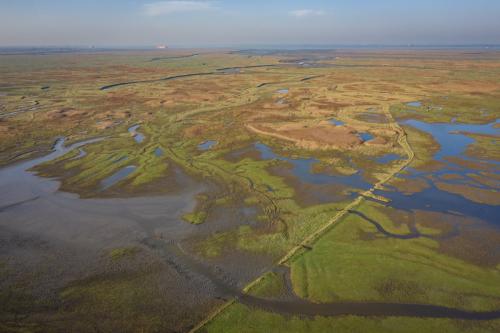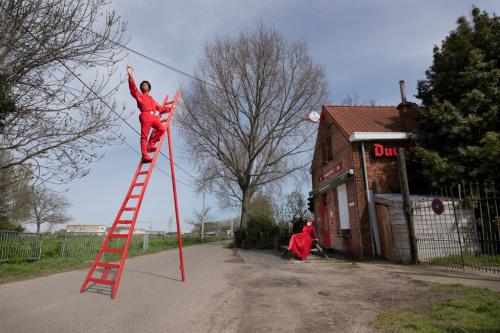This page provides partners with all relevant information about Geopark Schelde Delta: core facts, guidelines, as well as toolkits and inspiration to help preserve, experience, and sustainably develop this remarkable area together. Our shared ambition is to carry the UNESCO designation with pride and use it as a springboard for forward-looking policies, supported by a broad and enthusiastic community.
Do you have inspiring examples of developments, communications, activities, etc. within Geopark Schelde Delta? Please send them to info@scheldedelta.eu so we can share them across our partner network.

UNESCO defines a Global Geopark as an area of international geological significance, managed through a holistic approach to protection, education, science, and sustainable development. Geological history, heritage, contemporary culture, and nature together shape the identity of the region. Geoparks follow a bottom-up approach, encouraging people to become aware of their landscape and to care for it more consciously. Attention is also given to sustainable tourism and the economic activities within the area.
Geopark Schelde Delta (GSD) is an active member of the European Geoparks Network (EGN) and the worldwide Global Geoparks Network (GGN). In addition, GSD takes the lead in fostering cooperation with other Geoparks in the Benelux and surrounding regions. In this way, we strengthen one another and contribute to the international visibility of the region.
The Geoparks in the Benelux are: Famenne-Ardenne, Mëllerdall Nature & Geopark, Geopark De Hondsrug, and Terra Vita Nature and Geopark.

Mission and ambitions:
The Schelde Delta is an extraordinary area and so geologically unique that on 27 March 2024, it officially received UNESCO Global Geopark status.
As Geopark Schelde Delta, we work together with our partners to raise awareness of this remarkable landscape among education, research, and tourism sectors.
We tell the story of a region that has served for thousands of years as a living laboratory, where people coexist with—and continually adapt to, the power of water.
Geopark Schelde Delta outlines six ambitions in its policy plan:
1. To put this unique area firmly on the map
2. To connect visitors and residents with the place
3. To strengthen cross-border cooperation
4. To use education to raise awareness of the identity of GSD
5. To promote sustainable tourism and geotourism
6. To encourage sustainable management and development

Unique in its kind
Nowhere else in the world is the struggle between humans and water as visible as in the estuary of the Schelde. The Flemish-Dutch Scheldt Delta is a unique cross-border estuary, where the tides of the North Sea push and pull on the course of the Scheldt, and where salt water merges into fresh water.
Over the centuries, the river and the sea together have profoundly shaped the landscape. Throughout millions of years, this area has repeatedly changed its appearance. Mainly due to rising and falling sea levels, and because the Scheldt shifted its course several times.
The landscape is full of contrasts, formed through the interaction of soil, wind, water, and tide. Gradually, humans began to leave an ever-stronger imprint on the environment. During and after the Middle Ages, large areas of land were reclaimed from the sea. In the interplay between people and nature, a multifaceted landscape of transitions emerged: between water and land, low and high, clay and sand, salt and fresh.
Moving with the tides of climate
The Scheldt estuary ranks among the world’s most vulnerable regions to climate change, due to its low elevation, population density, and economic activity. This makes the Geopark Schelde Delta a living climate laboratory and an international frontrunner in adapting to climate change and rising sea levels.
40 geosites as the backbone
A Geopark must include at least forty geosites that are protected. Together, they illustrate the geological history of the entire area, ensuring that future generations can learn what makes these places so special. These forty geosites form the backbone of Geopark Schelde Delta, without excluding other remarkable parts of the region. All forty sites are already protected under existing regulations; the UNESCO designation does not impose any additional restrictions.
Partner network
Geopark Schelde Delta is an initiative supported by five provinces (Zeeland, North Brabant, West Flanders, East Flanders, and Antwerp) and aims to build a strong and dynamic partner network.
The core team consists of representatives from these five provinces. In addition, GSD includes an active partner network of more than 130 organisations. These partners meet regularly in working groups and during partner days to discuss progress and coordinate activities.
Geopark Schelde Delta actively supports its partners in realising shared ambitions. This includes submitting joint funding applications (for example through Interreg grants) and participating directly in projects within the area.
The Geopark Schelde Delta also has a Science Chamber: a network of experts providing scientific substantiation and knowledge exchange. Partners can draw on this expertise for content support and further development.
More information about how the partner network operates and about our plans can be found in the policy plan.
UNESCO Global Geopark Schelde Delta as a quality label
The UNESCO label is a mark of quality that attracts visitors, stimulates the local economy, and contributes to the sustainable development of the region. To maintain this designation, an annual activity report must be submitted, and every four years a revalidation visit takes place, during which UNESCO assesses whether the status can be retained.
The use of the UNESCO logo is governed by specific rules and agreements. In addition to these, Geopark Schelde Delta encourages its partners to present the region as a valuable and inspiring geopark, one that we proudly showcase together. The Geopark Schelde Delta brand framework defines the feeling and identity we wish to convey with this label.
